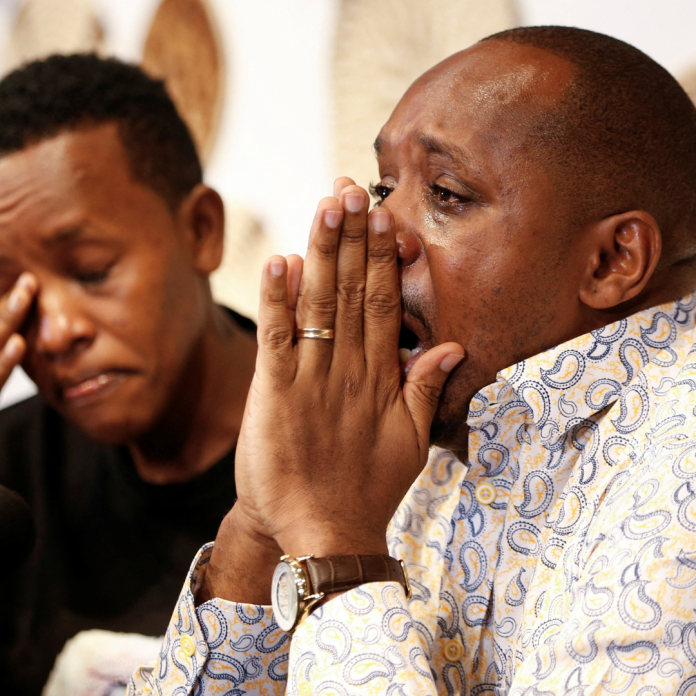In May 2024, two East African activists set foot in Tanzania to support a fellow dissident. Days later, they would be dumped at the borders of their countries—battered, humiliated, and forever changed.
Now, they are fighting back.
Boniface Mwangi, a celebrated Kenyan photojournalist, and Agather Atuhaire, a Ugandan lawyer and anti-corruption crusader, have announced plans to sue the Tanzanian government over what they describe as abduction, torture, and sexual abuse at the hands of security forces. “We’re not going to let them get away with this,” Mwangi told The Guardian. “This isn’t just about us. It’s about every Tanzanian who has suffered in silence.”
At a recent press conference, the two broke their silence—and the region listened in shock. Mwangi, a veteran of activism in Kenya, choked back emotion as he described being sexually assaulted, beaten, and degraded. Atuhaire, who just last year received the U.S. State Department’s International Women of Courage Award, recounted being smeared in excrement and photographed naked after being tortured. “I didn’t see us coming out of there alive,” she said. “It was really, really painful.”
A New Low in a Widening Crackdown
The pair had traveled to Dar es Salaam to attend a court hearing for Tanzanian opposition leader Tundu Lissu, who faces treason charges. But on May 19th, they say they were abducted from their hotel by plainclothes officers, driven away, and subjected to hours of brutal torture that has left them physically and psychologically scarred.
At a police station, Mwangi said he was slapped and punched in front of lawyers. Later, both were blindfolded, handcuffed, and taken to an unknown compound. There, they were stripped, hung upside down, and beaten on the soles of their feet with wooden planks. When they screamed, the captors gagged them—stuffing Mwangi’s own underwear in his mouth.
Then came the most degrading phase. Their captors allegedly sexually violated them, smeared Atuhaire with feces, and took photographs. They warned the activists to keep silent. Two days later, they were dumped at their respective borders, still in pain.
“Nothing Prepared Me for This”
“I’ve been beaten, bombed, and shot at,” Mwangi said. “But I have never felt such pain. This was different. It was meant to humiliate and break us.”
Atuhaire, still healing from foot injuries and ongoing trauma, said the ordeal revealed the extent of impunity within Tanzania’s security forces. “We must expose this,” she said. “Justice is more important than any shame.”
Their testimonies mark a chilling escalation in the tactics used by Tanzanian authorities—not only against domestic dissenters, but now, foreign critics too. In a region long scarred by authoritarianism, this targeting of outsiders has sounded a regional alarm.
The Legal Fight Begins
Mwangi and Atuhaire are now preparing lawsuits in Tanzanian courts. But they’re not stopping there. They also plan to pursue justice at the East African Court of Justice and the African Court on Human and Peoples’ Rights.
Their case could test the limits of regional accountability—and the political courage of Tanzania’s neighbors. “We’re doing this not just for ourselves,” Atuhaire said. “We’re doing it for the people whose voices never get heard.”
Official Denials, Unofficial Patterns
The Tanzanian government has denied involvement, but acknowledged investigations are underway. “These claims are highly doubtful,” said the country’s UN representative, Abdallah Possi, in Geneva. “But we take them seriously.”
Yet a chilling pattern has emerged.
- In September, opposition figure Mohamed Ali Kibao was found dead—his face burned with acid.
- In April, a priest known for calling out rights abuses was beaten near his home.
- This month, a church was deregistered after its leader criticized disappearances and called for national prayers.
- And just days ago, two men were arrested for hosting YouTube talk shows about governance.
President Samia Suluhu Hassan, once hailed as a reformist after taking over from the late strongman John Magufuli, is now accused of overseeing a creeping return to authoritarianism.
“She’s Reading From a Dictator’s Manual”
“There’s no evidence she ordered any of it,” said Tanzanian activist Maria Sarungi Tsehai, who now lives in exile in Nairobi. “But there’s also no evidence she’s stopping it.”
Sarungi herself was briefly abducted from the streets of Nairobi last year—an incident widely believed to have been a failed cross-border rendition attempt. She believes Suluhu’s administration is running scared ahead of elections. “What we’re seeing,” she said, “is a presidency in panic.”
Mwangi agrees. “She wants to win by any means necessary,” he said. “She’s reading from a dictator’s manual—brutalize and silence everyone.”
A Warning to Activists Everywhere
Earlier this month, President Hassan issued a warning to “activists from neighboring countries” not to “destabilize Tanzania.” For critics, the message was clear: stay out—or face the consequences.
But Atuhaire is undeterred.
“They can try to silence us with terror,” she said. “But it’s not going to work. If we stay quiet, we become complicit. And I refuse to be complicit.”
The Price of Truth
For now, both activists continue to recover. Their bodies ache. The trauma lingers. But their resolve is unshaken.
“There’s no level of shame or stigma more important than justice,” Atuhaire said. “What they did to us—they’ve done to countless others. It has to stop.”
“This is not just about Boniface and Agather,” Mwangi said. “This is about every Tanzanian who can’t speak. We will be their voice—loud, angry, and unafraid.”


